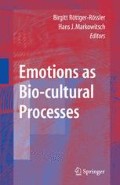Abstract
Several fictitious scenarios provide us with questions about the nature of artificial and natural feelings. It turns out that, traditionally, three features are relevant for the attribution of an emotion to humans: the functional role it typically has; the phenomenal quality that typically accompanies it; and the neurophysiological basis that brings about the phenomenal state. On the basis of these features I discuss several cases: artificially generated feelings, feelings in artificial systems, and unfelt emotional processes in psychopathology.
Access this chapter
Tax calculation will be finalised at checkout
Purchases are for personal use only
References
Aristotle. On the Soul (de anima) (D. W. Hamlyn, Trans.). Oxford, UK: Clarendon Press, 1968.
Aristotle. Rhetoric (W. R. Roberts, Trans.). Retrieved July 19, 2006 from http://classics.mit.edu/Aristotle/rhetoric.html
Coulmas, F. (1993). Das Land der rituellen Harmonie. Japan: Gesellschaft mit beschränkter Haftung [The land of ritual harmony. Japan: Society with limited liability]. Frankfurt, Germany: Campus.
Dennett, D. (1978). Why you can’t make a computer that feels pain. In D. Dennett (Ed.), Brainstorms (pp. 190–229). Brighton, UK: Harvester Press.
Descartes, R. (1649). The passions of the soul (Les Passions de L’Ame). In: The Philosophical Writings of Descartes (J. Cottingham, R. Stoothoff, & D. Murdoch, Trans.) Vol. 1. Cambridge, UK: Cambridge University Press, 1985.
Doi, T. (1973). The anatomy of dependency. Tokyo: Kodansha International.
Doi, T. (1986). The anatomy of self: Self versus society. Tokyo: Kodansha International.
Engelen, E.-M., Markowitsch, H. J., von Scheve, C., Röttger-Rössler, B., Stephan, A., Holodynski, M., et al. (2008). Emotions as Bio-cultural Processes: Disciplinary Debates and an Interdisciplinary Outlook. In H. J. Markowitsch & B. Röttger-Rössler (Eds.), Emotions as Bio-cultural Processes. New York: Springer.
Hille, K. (1997). Die ,künstliche Seele’. Analyse einer Theorie [The “artificial soul”]. Wiesbaden, Germany: Deutscher Universitätsverlag.
Homer. The Iliad (S. Butler, Trans.). Retrieved July 19, 2006 from www.abcd-classics.com/homer/theiliad/the_iliad.html
James, W. (1983).The principles of psychology (with an introduction by G. A. Miller). Boston, MA: Harvard University Press. (Original work published 1890)
Leuner, H. (1985). Lehrbuch des Katathymen Bilderlebens [Textbook of catathymic reverie]. Bern, Switzerland: Huber.
Moser, U. (1978). Affektsignal und aggressives Verhalten. Zwei verbal formulierte Modelle der Aggression [Affect signal and aggressive behavior: Two verbally formulated models of aggression]. Psyche, 32, 229–258.
Solms, M. (1996). Was sind Affekte [What are affects?]? Psyche, 50, 485–522.
Stephan, A. (2006). The dual role of ‘emergence’ in the philosophy of mind and in cognitive science. Synthese, 151, 485–498.
Thomä, H., & Kächele, H. (1987). Psychoanalytic Practice. Vol. 1 Principles. Berlin: Springer.
Author information
Authors and Affiliations
Corresponding author
Editor information
Editors and Affiliations
Rights and permissions
Copyright information
© 2009 Springer Science+Business Media, LLC
About this chapter
Cite this chapter
Stephan, A. (2009). On the Nature of Artificial Feelings. In: Markowitsch, H., Röttger-Rössler, B. (eds) Emotions as Bio-cultural Processes. Springer, New York, NY. https://doi.org/10.1007/978-0-387-09546-2_11
Download citation
DOI: https://doi.org/10.1007/978-0-387-09546-2_11
Published:
Publisher Name: Springer, New York, NY
Print ISBN: 978-0-387-74134-5
Online ISBN: 978-0-387-09546-2
eBook Packages: Behavioral ScienceBehavioral Science and Psychology (R0)

